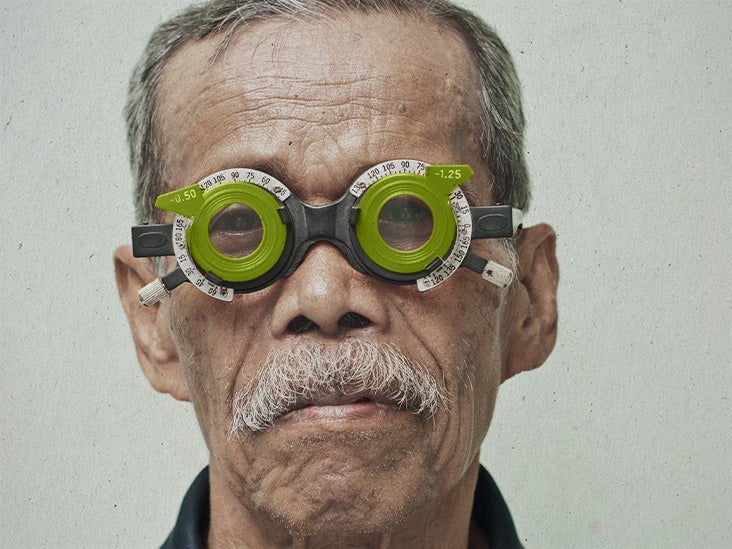
Untreated vision impairment in older adults correlate with dementia
Share on PinterestVision problems could be related to dementia and cognitive impairment. Yasser Chalid / Getty ImagesA new study study reveals a strong correlation between vision loss and dementia and cognitive impairment.More research should investigate a possible causal connection.Doing eye exams and treating vision problems as they arise is beneficial for people as they agIt is common for older people with dementia to also experience impaired vision. A new study from the Medical Informatics Center at Peking University in China suggests that it may also work in reverse.
Researchers have documented a strong association between older people who have vision problems and those who eventually develop dementia or cognitive impairment.
The study’s lead author, Associate Professor Beibei Xu, says:
“This study is one of the first to assess the association between vision problems and cognitive outcomes in older adults through a thorough examination of all available population-based studies in English. Our findings add to the growing evidence that vision loss is a risk factor for developing dementia. ”
However, the link between vision loss and dementia is unclear.
“Diagnosis and treatment of eye conditions can be beneficial, both to improve a person’s quality of life and to delay or stop memory loss.” – BeiBei Xu, lead author
Dr. Nathaniel Chin, of the Division of Geriatrics and Gerontology in the Department of Medicine at the University of Wisconsin, who did not participate in the study, told Medical News Today:
“This is a strong study. [It] did a good job in the methods used for their systematic review and in their statistical approach to the large data set they collected. While acknowledging that the field has individual studies that show conflicting and contradictory results, their overall assessment seems compelling that there is an association between visual impairment and cognitive impairment. ”
Dr Thomas J. Littlejohns, a senior epidemiologist at Oxford Population Health in the UK who was also not involved in the study, found the study to be valuable as well and told MNT:
“This study helps clarify the existing evidence on the relationship between poor vision and cognitive problems.”
“It is important to note,” Dr. Littlejohns added, “that the study did not generate new findings, but identified previously published studies and compiled them to produce a global finding using a meta-analysis approach.”
The study is published in the journal Aging and Mental Health.
The researchers looked for studies on vision loss and dementia published before 2020. The databases included PubMed, Web of Science, Embase, and PsycINFO.
From these sources, the study authors extracted 4,580 records, removing duplicates and irrelevant research, and finally identified 16 high-quality studies that included 76,373 participants aged 50 years or older.
The general conclusions of the studies were as follows:
According to objective and subjective (self-reported) visual assessments, visually impaired people had an approximately 60% higher risk of dementia or cognitive impairment. At the start of the studies, the probability of having a cognitive impairment was 137% higher. among visually impaired people compared to those who did not. Compared with people without vision problems, those with visual impairment at the start of studies had a 44% higher risk of suffering from incidental (posterior) dementia, with a 41% higher risk. of incidental cognitive impairment.
“All studies included,” Dr. Littlejohns noted, “were observational and many measured vision as well as cognition. Therefore, it is not possible to determine whether visual impairment causes cognitive impairment or whether something else is responsible, such as now ill health “.
This was also a concern for Dr. Chin, who explained:
“Studies like this can show an association, but they cannot confirm that one provokes the other, which is what matters to the general public and patients. In order for the cause to be determined, a randomized clinical trial is needed. ”
The study does not attempt to identify the physiological connection between vision impairment and dementia or cognitive impairment.
Dr. Chin mentioned that “in the visually impaired, there are broken cells in the eye and optic nerve that lead to a decrease or little entry into the brain. This “degraded” input can lead to errors in perceptual processing and other subsequent cognitive functions. ”
“This is similar to another cause of sensory deprivation, or the ‘use it or lose it’ theory, that having less vision stimulation causes brain processes to break down that depend on that vision.”
“It could be the case that a reduced ability to see daily life leads to less cognitive stimulation, or it could make people more socially isolated, even though this is speculation.” – Dr. Thomas J. Littlejohns
Dr. Chin noted that the apparent link could be that “people with lower vision perform worse on cognitive tests and therefore have lower scores indicating a decrease or deterioration when, in fact, the changes in the tests they are related to the test of the bad vision “.
Finally, Dr. Littlejohns mentioned another possibility:
“Alternatively, it could be just a spurious correlation, and more research is needed to try to really understand how visual impairment could lead to cognitive impairment and possibly dementia.”
In any case, Dr. Chin, who is a practicing physician who comes to elderly patients, suggests that vision strengthening is generally a good strategy, especially as you age:
“When [my patient’s] The ophthalmologist identifies cataracts, I start talking about cataract surgery. I mention the potential benefit of reducing the risk of future cognitive impairment, as well as safer driving and a reduced risk of falls. ”
“LASIK surgery is a more complicated discussion because other non-surgical treatments can offer the same benefit, but without the risk or cost of surgical complications,” said Dr. Chin, adding: “If LASIK surgery were the only option to improve visual acuity, it is a reasonable discussion and consideration.”
“I want my patients to have clear vision for many reasons, and one of them is cognitive health. I encourage patients to have routine eye exams. ” – Dr. Nathaniel Chin

Comments are closed.